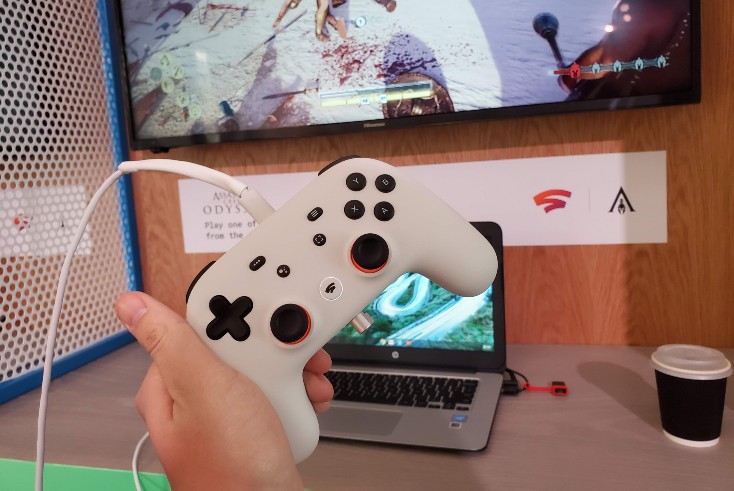What is Netflix’s gaming strategy and why did Google’s Stadia flop?

Netflix is aggressively making forays into gaming, investing in game development and beginning to offer game streaming on smart TV and desktop.
In a recent episode of The Media Leader Podcast, gaming experts Lucy Rissik and Nina Mackie briefly unpacked Netflix’s strategy, and how it hopes to find success where Google’s Stadia failed.
Listen to the clip, or read a transcript of the conversation, edited for clarity, below.
Jack Benjamin: [Netflix has] been aggressively looking to move into gaming now for a little bit. They acquired a number of game developer studios last year. Within the past two weeks, they’ve announced a number of new titles based on their own IP, Love is Blind, I think is the first one.
Lucy Rissik: Which is very clever. I love that. I just love that as an idea, it’s brilliant.
JB: And then they’re also making games available via streaming on smart TVs, PCs, whereas previously they were just on mobile. I’m curious what you make of Netflix’s strategy and how it can avoid being Google Stadia.
LR: They are definitely big, they were big at Gamescom. The stand for Netflix was huge. They had Stranger Things, they had the Upside Down, but they also had The Mole there, and the other part they were massively pushing was Wednesday. And I think it was realising the audiences are aligned. And so I think it’s exciting, I’m looking forward to seeing what they’re going to do next, but they’re doing it in the right way of going through the right mediums of using their content. I think with that connection, because that’s their authenticity; they know their audiences are watching Wednesday, so therefore, Let’s go in the right places with them.
Nina Mackie: I agree, I think Netflix have been sort of tentatively moving into gaming for a number of years now, actually, this isn’t new by any means. And their mobile games have been out for a while now, I have a few of them.
JB: Are they good?
NM: Not gonna comment. [Laughs] They need a bit of development, let’s just say.
LR: It’s a good starting point.
NM: It’s a very good starting point. But I agree, it’s totally exciting to see Netflix recognising the opportunity of their own IP. I mean, The Last of Us, right? Fantastic example of how you can use one entire audience on one platform, or one channel, and then transition it into TV. It works the other way around. We’ve seen that work; if you ask most gamers what their second-favourite thing is, it’s going to be streaming movies, short stories, content. So it’s a good match, movies and gaming always has been. So I think for Netflix, I think there’s going to be a lot of really exciting new game development.
LR: I think it’s good to see new people coming in. I think Google was trying to be everything to everyone, and what Netflix is trying to do is they’re going We’re going to be this to these people.
NM: I think Stadia just was — I liked the concept of it — but it was probably a little bit too soon for that kind of concept. Cloud gaming is a thing, they didn’t get that bit wrong. But the problem was they had very limited titles, it actually wasn’t that good a deal, either.
LR: It wasn’t cheap either.
NM: It wasn’t cheap, that’s the thing. So in relation to just buying the title, I think to rent [a game] was like $10 or something like that.
JB: Right, you didn’t have a reason to use Stadia over if you already owned a console. But perhaps if you already have a Netflix subscription, you’re not paying more for the game, then why not?
NM: Exactly.
LR: But not adding anything else too, like a Fire Stick or something else that’s going into the TV, or signing up to anything else. I think people prefer that.
NM: We’ve seen Amazon Prime do this, where you’ve got all your channels set under your Prime membership and subscription, but then you can also pay a little bit more, like £3.99 a month, if you want to have, say, crime series and things that aren’t free. So I think, again, we’re going to see a slight development of Netflix’s model. I’ll be interested to see what the commercialisation of that looks like. Because I think, really honestly, that’s where Google Stadia just flopped, because it didn’t really get that price point right.
LR: I wonder if that’s because of their background. ‘Cause really, theirs is ads, that’s how they generate income. Netflix have already got that subscription model—I know there’s Google Play—but it helps.
JB: And Netflix is getting ads as well.
LR: It doesn’t feel uncomfortable for the users. Where they’re like, I’m already subscribing, it’s already in a safe environment. Not that Google’s unsafe.
NM: I think as well, when you look at Google versus Netflix, I look at Netflix and I say that is the home of content, because I go there for watching TV series and movies. So why not games? It makes more sense, they’re an entertainment platform. Whereas, with Google I see them more as tech.
LR: Yes, you use it in different ways. You use it in business and all sorts of different things.
NM: Exactly, it’s more of a tech platform. I’m going to be very keen to see how [Netflix] figure out the price points and the subscription model and what that’s going to look like.
LR: It’s going to be interesting. Taking the big stand at Gamescom is a real definite foot—we’re here, this is us, we’re going this way now.
Listen to whole episode below and hit ‘subscribe’ to download the episode on your favourite podcast player, as well as get notified about future episodes:




